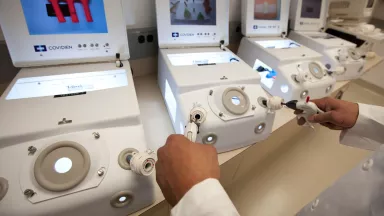Introduction
Our world-renowned orthopedic surgeons and orthopedists are experts in their fields with specialized training to provide the optimal diagnosis and treatment for a range of orthopedic conditions. We are internationally recognized for delivering the highest-quality orthopedic care to our patients.
What are symptoms of hip problems in younger children?
How does the hip work?
What causes hip problems in younger children?
What causes hip pain in younger children?
Hip pain in younger children can have different causes, depending on the location or condition:
- An inflammatory reaction, such as transient or toxic synovitis, which generally occurs after the child has a cold or other upper respiratory infection. This is the most common cause of hip pain in children.
- A slipped capital femoral epiphysis, which occurs when the upper end of the thigh bone (head of the femur) slips at the growth plate (epiphysis) and does not fit into the hip socket correctly.
- Legg-Calve-Perthes disease, which is caused by decreased blood flow to the head of the femur, affecting the bone as can be seen on an X-ray or MRI of a child with this problem.
- An inward twisting of the thigh bone (femoral anteversion), which causes the knees and feet to turn inward. The child will have a pigeon-toed appearance and may have an ungainly walk.
- Developmental dysplasia of the hip (DDH), which is caused by a condition in the development of the hip joint. The top of the femur does not fit correctly into the hip socket (acetabulum) so the femur can partially or completely slip out of the socket.
- Juvenile idiopathic arthritis (JIA), which causes inflamed, swollen joints that are often stiff and painful.
- Infection in the joint (septic arthritis), bursa (septic bursitis), hip or pelvic bone (osteomyelitis).
- In rare cases, cancer of the bone, such as osteosarcoma.
How is it treated?
Treatment for a hip problem depends on the location, type and severity of the problem as well as the child’s age, general health and activity level. Treatment may include first aid measures; application of a brace, cast, harness or traction; physical therapy; medicine or surgery.
Check your child’s symptoms to decide if and when your child should see a doctor.
Physician Referrals
Montefiore Einstein embraces a collaborative approach.
If you have a patient who could benefit from our services, please reach out.
718-920-2060
Schedule a Visit
Have a general question or concern?
We’re available to help you by phone or email.
• 718-920-2060 • orthofeedback@montefiore.org






